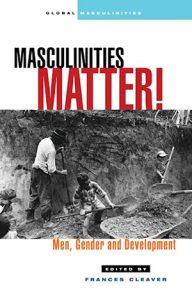Masculinities Matter!: Men, Gender and Development (Series: Global Masculinities)

Editor: Frances Cleaver
Publisher: Zed Books
Year of Publication: 2002
Print Length: 256 pages
Genre: Non-Fiction / Political Science, Social Science
Area: Africa, Cuba, India, Kenya, Namibia, Uganda, Vietnam
Topic: Man and Masculinity, Gender; Modernity, Modernism, Modern; Development, Policy & Practice, Politics & Power, Organization, Governance, Cultural Heritage/Legacy, Culture & Society, Equality & Inequality, Social Construct, Social Change, Change, Social Justice, Domestic & Public, Local & Global, Patriarchy, Nation-Building & Nationhood, Nationalism, State Formation, Hindutva, Civil War, War, Conflict & Post-Conflict, Violence & Mass Violence, Military, Gender-based Violence, Precarity, Identity, Class, Race, Age and Generation, Children & Childhood, Fragility, Vulnerability, Socialism, Colonialism & Post-Colonialism, Apartheid, Activism; Self-Determination, Autonomy, Agency; Education, Rural, AIDS, Sexual Etiquette, Sexuality, Feminism, Woman and Femininity, Medicine & Healthcare, Mental Health, Challenges & Opportunities, Future Scenarios
Men appear to be missing from much gender and development policy. However, emerging critiques suggest the need to pay more attention to understanding men and masculinities, and to analysing the social relationships between men and women. This book considers the case for a focus on men in gender and development, including arguments based on equality and social justice, the specific gendered vulnerabilities of men, the emergence of a crisis of masculinity and the need to include men in development as partners for strategic change.
Incorporating men into gender and development requires us to reconsider some of the theories and concepts which underlie policies. This book addresses a variety of such concepts and debates including the links between modernization, development and gender, whether feminist analytical frameworks are appropriate for incorporating men and their concerns, how useful the concept of hegemonic masculinity is in understanding different cultural conceptions of manliness, and the need to find ways of combining concern with micro level and private social relations with an analysis of macro level trends and structures.
Chapters in this book draw on experience from a variety of geographical areas and different development projects and processes to analyse men and masculinities and to draw out implications for policy and practice. Subjects covered include working with children and in schools, impacting upon sexual health and intimate relations, and working with men in women’s groups. Other chapters look at gender relations and masculinities in situations of violence and conflict, the role of the state and ideologies of nationalism in shaping masculinities, and the interlinking of gender relations with race and class. Overall they illustrate the complexity of economic and social relationships shaped by local, national and international processes, and the importance of incorporating an understanding of men and masculinities into gender and development.
Table of Contents
About the authors
Foreword — Michael Kimmel
1. Men and Masculinities: New Directions in Gender and Development — Frances Cleaver
The case for including men / Masculinities and gender: recurring themes / Policy implications and new direction / Conclusion
2. Nationalism, Masculinity and the Developmental State: Exploring Hindutva Masculinities — Prem Vijayan
Central themes / The Indian case: Hindu nationalism and development / Hindu nationalism, patriarchy and masculine hegemony / Some remarks on methodology / Concluding remarks
3. Collapsing Masculinities and Weak States – A Case Study of Northern Uganda — Chris Dolan
Contextual background / What is the role of masculinity in the war? / What is the hegemonic model of masculinity in northern Uganda? / What is the gap between model and reality? Inability to fulfil external and internalized expectations / Does this situation increase the likelihood of violent behaviour by non-combatants? / Does the model increase male vulnerability to violence? / Masculinity or masculinities? Does conflict reinforce a hegemonic/narrative model? / Implications for interventions in the area of masculinities
4. Lenin, the Pinguero and the Cuban Imaginings of Maleness in Times of Scarcity — David Forrest
Masculinities and men: problems or problematic concepts? / Culture, class, race and the ‘marketing’ Cuban fogosidad / State socialism, endemic shortages and the international division of labour / Collapse, social shifts and the rise of tourism / Jineterismo and the new guides of the international proletariat / Victims and hunters: the problem of locating power in gendered discourses / Pingueros as sexual explorers or sex-workers? The futility of definition / Conclusions
5. Deconstructing Domination: Gender Disempowerment and the Legacy of Colonialism and Apartheid in Omaheke, Namibia — Niki Kandirikirira
A critical journey / The impact of apartheid ideology / The consequences for the emerging adults of new Namibia / Taking action / Conclusion
6. Men in Women’s Groups: a Gender and Agency Analysis of Local Institutions — Helen Hambly Odame
Gender and institutions in rural areas / Women’s groups in Kenya / Evidence from Siaya district in western Kenya / Men in women’s groups / Conclusion
7. Boys will be Boys: Addressing the Social Construction of Gender — Marilyn Thomson
Cultural identity and socialization / Changing gender relations / Gender-based violence / Working with boys and men / Conclusions
8. Why Do Dogs Lick their Balls? Gender, Desire and Change – A Case Study from Vietnam — Neil Doyle
Origins of the research / A note on methodology / Why men are all the same / Why men are all different / A place for desire / Can men change? / A way forward
9. Targeting Men for a Change: AIDS Discourse and Activism in Africa — Janet Bujra
AIDS is gendered / Men and social power in Africa / African male sexuality / Homosexuality: African denial / Masculinities: African perspectives / Lushoto / Identity of husband and father / Interventions / Men on the move / Men and the military / Men, women and sex / Conclusion
Index

Frances Cleaver is a Professor in Political Ecology based at the Lancaster Environment Center, Lancaster University. She used to be a senior lecturer at the Bradford Centre for International Development. Her research, mainly in central and southern Africa, includes investigating the gendered nature of participation in local institutions and social capital, aside from natural resource governance, particularly in the context of water, land and forests, and local service delivery. Her work focuses on understanding how institutions shape social and power dynamics while influencing access to resources, a concept she has coined as ‘institutional bricolage’. From 1998-2000 she coordinated an ESRC Seminar Series on Men, Masculinities and Gender relations in Development.
Source: https://www.bloomsbury.com/uk/author/frances-cleaver/ & https://makit.edu.umontpellier.fr/en/frances-cleaver/
More from Frances Cleaver in this library, click here.
